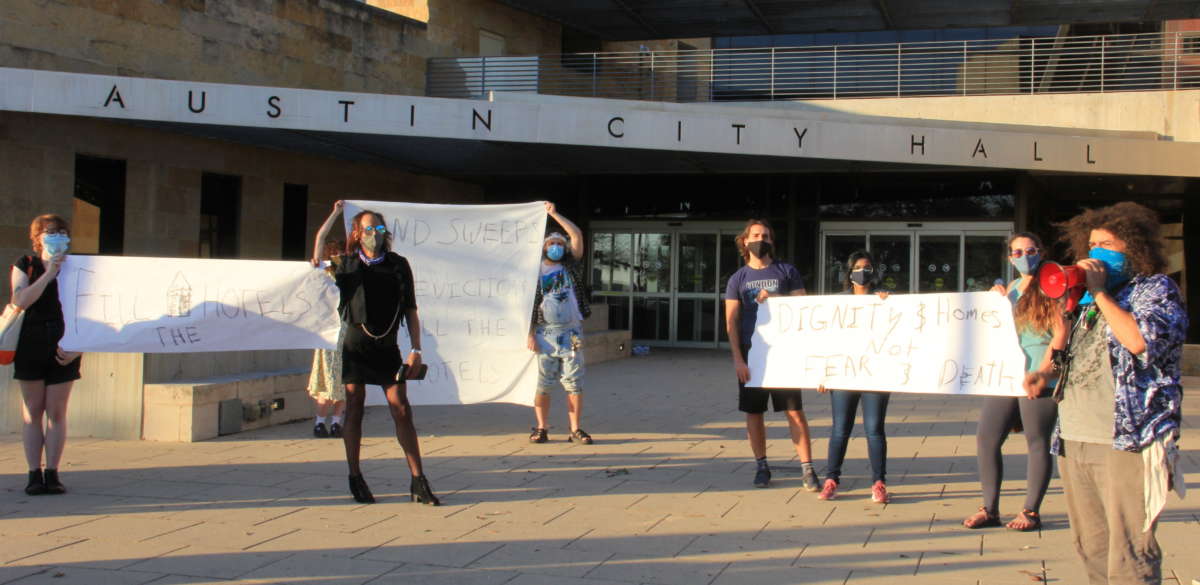Did you know that Truthout is a nonprofit and independently funded by readers like you? If you value what we do, please support our work with a donation.
Austin, Texas—About 70 Austinites gathered at the Homeless Memorial and Tree of Remembrance along the south bank of Lady Bird Lake on Sunday for a vigil in honor of unhoused people who lost their lives during last week’s winter storm and blackout in Texas.
It was a surreal scene, as shirtless parkgoers along the river’s bank exercised, threw frisbees and soaked up the sun as temperatures reached back into the upper 60s for the first time since the state was plunged into extreme winter conditions last Monday. The storm took down the state’s independent energy grid, touching off a power and water crisis that remains ongoing even as conditions improve.
At Sunday’s vigil, activists with Stop the Sweeps and The Challenger newspaper in Austin placed votives at the memorial in honor of an unhoused woman who was living at a state-sanctioned homeless encampment known locally as “Camp Abbott” who they say died from cardiac arrest on Monday. EMS officials told Austin American-Stateman’s Katie Hall that they are unsure whether exposure was a factor in the woman’s death.
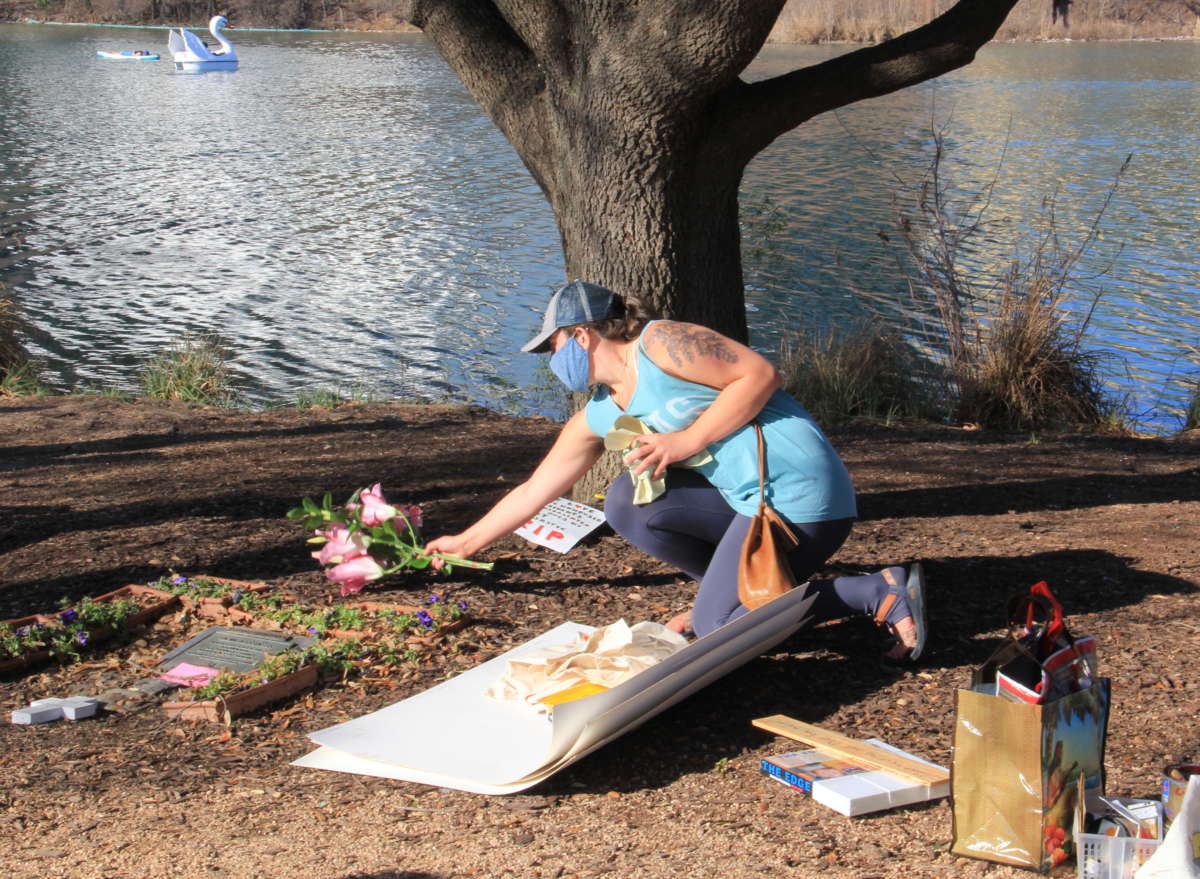
Robert Lott, an unhoused veteran living in an encampment along César Chávez St. in downtown Austin told Truthout during the vigil Sunday that he was approached by an organization that was able to get him into a hotel on the Friday before the storm hit. “I just thank God, because with my age, I’m 68, so I don’t know if I would have lasted in a tent on those cold nights because once you go to sleep, you’re not guaranteed to wake up,” he said. Lott has to leave his hotel on Tuesday, when he says he will return to his tent on César Chávez.
The storm and subsequent blackout that tore across the country last week caused at least 70 winter storm-related deaths, according to the Associated Press. Most of those deaths occurred in Texas. It remains unclear exactly how many of the people who died were experiencing homelessness. More than a dozen people died in homes that lost heat, including an 11-year-old boy in Conroe, Texas.
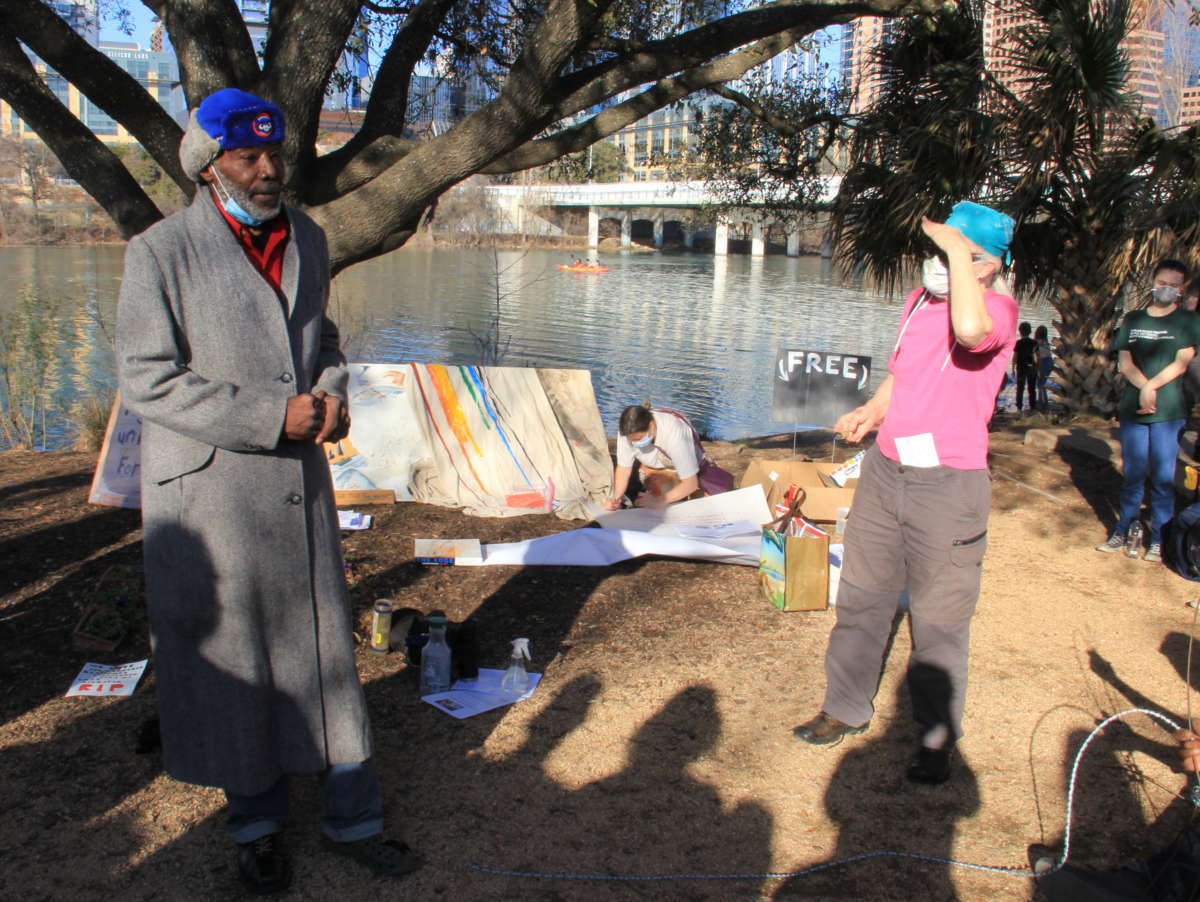
As the state thaws out and power is restored for hundreds of thousands, many are still dealing with widespread water problems and food supply chain disruptions. During a press briefing Sunday, Gov. Greg Abbott said that at least 13,000 “Texans still did not have power due to issues with local power providers.” As of Monday morning, nearly 8.8 million people were still dealing with water issues, including more than 120,000 without running water, according the Texas Commission on Environmental Quality. While Austin remains under a partial boil-water advisory, at least 260 other boil-water notices have been rescinded.
“I’m 68, so I don’t know if I would have lasted in a tent on those cold nights because once you go to sleep, you’re not guaranteed to wake up.”
State officials over the weekend said they have ordered nearly 10 million bottles of water and more than 5 million ready-to-eat meals they will continue to deliver with the aid of the Texas National Guard. Meanwhile, mutual aid organizers continue to work in the most vulnerable parts of the state to fill in the gaps, and neighbors are continuing to meet their communities’ needs by sharing resources and providing assistance to one another.
The parts of the state which took the biggest hit from Winter Storm Uri are largely under-resourced communities of color whose infrastructure has long been inadequate and neglected, mutual aid organizers say. These include areas of South Dallas and the border communities known as the colonias — informal settlements that lack basic necessities, often including potable water, septic or sewer systems, electricity, paved roads, or safe and sanitary housing.
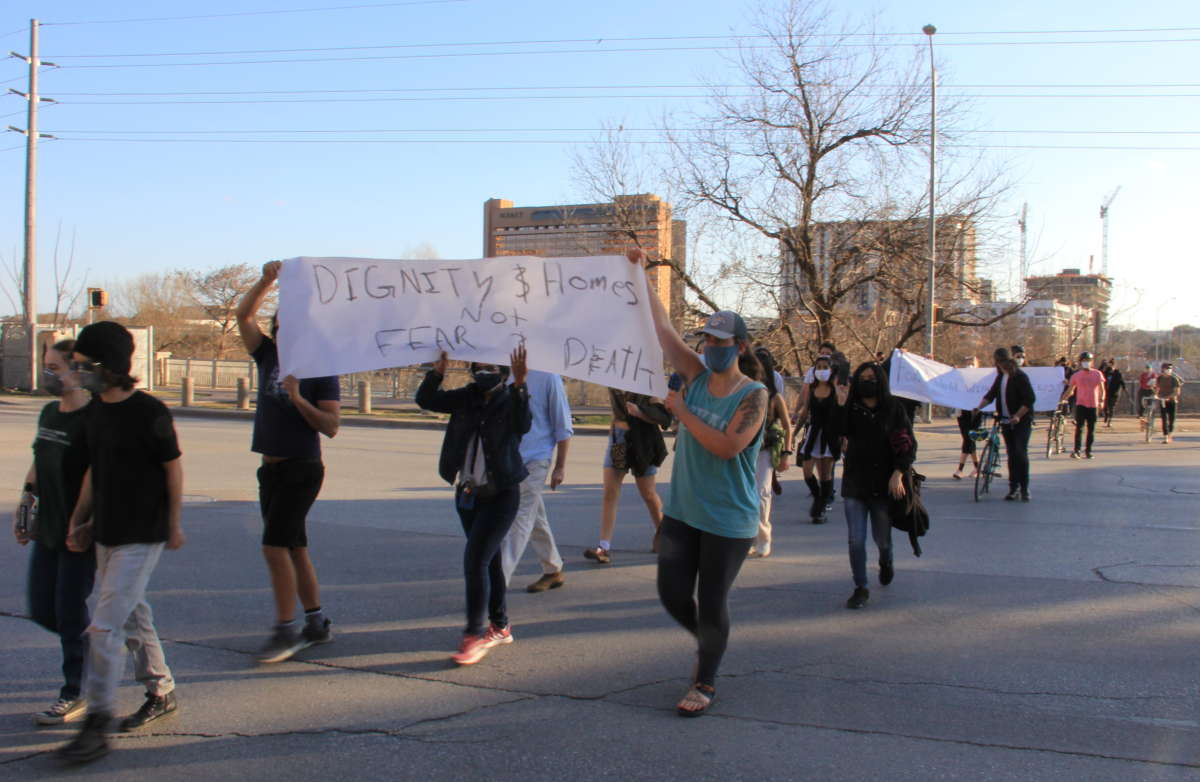
In the heart of South Dallas, police accountability and mutual aid organizer Walter “Changa” Higgins took a quick break from preparing meals at the Warren United Methodist Church to tell Truthout about Dallas groups’ organizing efforts. Higgins has been working in coalition to deliver hot meals to camps of people experiencing homelessness and doing wellness checks in low-income neighborhoods of color in South Dallas.
Higgins said the groups’ work has been most important in regard to people with mobility issues or others who are worried about leaving their homes or encampments.
“The city did a pretty good job on setting up stations and places for people to go to get warm, but the problem is actually getting people there,” Higgins told Truthout. “Then they were using electronic ways of letting people know that these resources are out there, and if your power is out, then how are you charging your phone to be able to see all these resources?”
The climate-fueled storm, Higgins says, amplified longstanding issues of environmental racism, lack of development, and old and neglected infrastructure in the under-resourced neighborhoods of South Dallas. These communities have long suffered a cycle of environmental degradation after major highways broke up neighborhoods and invited heavy industry into the area, which in turn, has long taken an environmental and health toll on the community, creating a downward spiral.
When the storm hit, these issues compounded, and the city hasn’t done enough to mitigate the harm, Higgins says. That’s why he and other mutual aid organizations are doing all they can to help support the largely Black community.
“The inaction on the city level from the mayor … just not having a citywide coordinated response for this type of work, I think, is a big value statement about the way our city operates,” Higgins says. “But you layer all those things on top of each other, and you got a serious crisis. You’ve got systemic problems coming to bear in real time, and breaking down and eroding everything even more with folks not having power and not having water.”
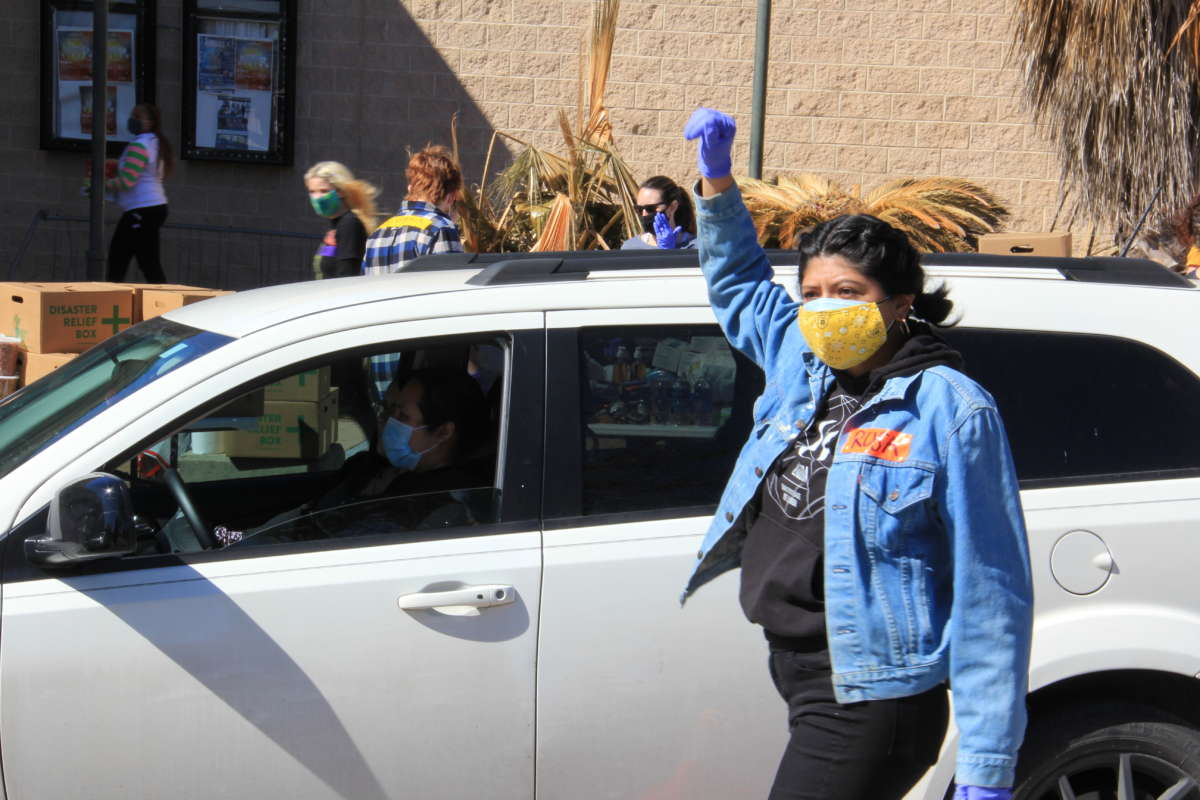
Meanwhile, on the border, organizers with La Unión del Pueblo Entero (LUPE) distributed gift cards, blankets and food to poor Latinos living in border colonias during the freeze last week, and are continuing to provide aid as conditions improve.
“Not having a citywide coordinated response for this type of work, I think, is a big value statement about the way our city operates.”
LUPE Communications Coordinator John-Michael Torres told Truthout that some colonias neighborhoods also lost water after power went offline, since the wells they rely on use an electric-operated pumps. Many fled to family members’ homes or hotels, which were quickly booked. Other border neighborhoods that have basic plumbing also experienced burst pipes, like so many others in the state.
In the colonias, as in South Dallas, Torres says the freeze exacerbated already existing problems of environmental justice. Many of the colonias neighborhoods that lost power and water are the same neighborhoods that have been hit the hardest by flooding, as predatory housing developers built some neighborhoods on semi-rural land in the region’s floodplains. Many of these neighborhoods are located in South Texas cities’ extraterritorial jurisdictions, and are still waiting for cities and counties to extend proper wastewater removal infrastructure to their areas.
“These are the same neighborhoods that have suffered for years from the effects of poor drainage, property damage and sickness that comes with flooding,” Torres says. “These areas where people are marginalized in a very difficult way from jobs and services are also marginalized from the spaces where they can lead active and healthy lives…. The impact on the geographic marginalization of these communities plays out in sicker, less healthy communities that struggle more, and then when there’s a bigger, badder storm that hits, they’re even more vulnerable.”

Mutual aid organizers and directly impacted Texans want to see real consequences for state leadership’s negligence and violence. In particular, people are calling attention to Sen. Ted Cruz, who fled the state to vacation in Cancún, Mexico, and Governor Abbott, who appoints the three-member Public Utilities Commission (PUC) overseeing the nonprofit Electric Reliability Council of Texas (ERCOT), which operates the state’s independent grid and initiated the statewide blackout that affected up to 4 million Texans last week.
“These are the same neighborhoods that have suffered for years from the effects of poor drainage, property damage and sickness that comes with flooding.”
Abbott has shifted blame to ERCOT, calling for investigations and reforms to the grid operator as an emergency agenda item for the 2021 legislative session, allowing the state legislature to approve ERCOT-related bills during the first 60 days. But Abbott’s blame game in regard to ERCOT, much like his misleading statements about the state’s wind turbines, avoids his own culpability.
Experts point out that ERCOT doesn’t even possess the enforcement power to require energy generators to upgrade and “winterize” their facilities. The legislature would need to implement those requirements, and it’s up to the PUC and the Texas Railroad Commission, which regulates oil and gas, to enforce regulations that apply to power companies.
King Hollis, whose pipes burst and flooded his home in McKinney, Texas, last week, wants to see ERCOT abolished and Texas become integrated into the U.S.’s two larger national power grids. Hollis is a Black filmmaker who has worked on issues of police-perpetrated violence and with the Dallas-based EarthxFilm to showcase environmentally themed films on Earth Day.
After his pipes burst Tuesday afternoon, he and his family and friends worked to bail water from his home using large containers for a number of hours before they were forced to evacuate. He’s now staying with a friend while dealing with the aftermath of the flood.
“I think Abbott’s whole move regarding ERCOT is spin and a political shield to continue business as usual. He’s going to slap people on the hand, keep the deregulations and coddle corporations.”
“I think [Abbott’s] whole move [regarding ERCOT] is spin and a political shield to continue business as usual. He’s going to slap people on the hand, keep the deregulations and coddle corporations,” Hollis told Truthout. “What the hell are you trying to reform? You’re reforming something that does not work, because what we’ve seen here cannot be fixed with a couple of notes from the governor.”
His experience last week, Hollis says, is evidence of environmental racism and the ways in which the state’s leadership has created environmental sacrifice zones in communities like his for the sake of deregulation and the corporate bottom line. Hollis railed against Senator Cruz “abandoning his post” as a public servant to vacation in Cancún.
“It is time to replace these politicians. It is time for people to run for office and get these babysitters for corporations out of office,” he says. “I’ve got a hot hand for a hot ballot. My hands are ready for that ballot box.”
Still, Hollis says, he was overwhelmed by the amount of support he received from friends and neighbors of all stripes who reached out with offers of food, water and a place to stay. “We have to stop letting politicians and pundits on cable news tell us who we are,” Hollis says. “We know what to do when the shit hits the fan. We define ourselves in times like these.”
“We know what to do when the shit hits the fan. We define ourselves in times like these.”
South Dallas mutual aid organizer Higgins agrees ERCOT should be abolished. “It would be good for us to [integrate into the national grid] because then there would be some kind of federal regulation, but there’s just a lot of players here and a lot of elite folks who’ve made a lot of money that want to see things stay the way they are.”
In addition to wanting Texas to abolish ERCOT and rejoin the national grids, organizers are calling for deeper investments in vulnerable communities of color and in the renewable sector. They want a Green New Deal.
“We do need an investment in green energy, green jobs, in our colonias, in our region and throughout the state of Texas,” LUPE’s Torres says. “There’s no reason that our community members, our sons and daughters, should have to travel off to West Texas to work in the oil fields or the Gulf coast to work on the rigs when they should have clean, green jobs here at home.”
Media that fights fascism
Truthout is funded almost entirely by readers — that’s why we can speak truth to power and cut against the mainstream narrative. But independent journalists at Truthout face mounting political repression under Trump.
We rely on your support to survive McCarthyist censorship. Please make a tax-deductible one-time or monthly donation.
